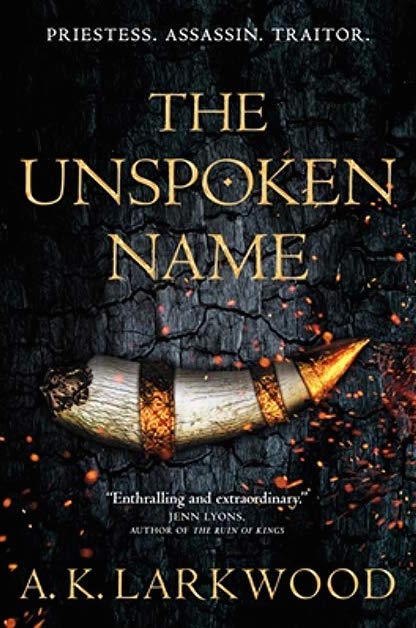When you think of orcs and wizards, chances are you’re thinking of some variation of Saruman with his nameless minions, the wizard in control, the orc eager to be told what to do. Standard, right? Well, not anymore. A.K. Larkwood takes that concept, runs with it for a bit, and then utterly obliterates it in her debut The Unspoken Name. Sure, Csorwe does become an able assistant to a wizard, and sure, Belthandros is the smiling and subtle master of powers beyond mortal ken, but that’s only where it starts.

Well, more properly it starts with Csorwe about to die. Raised to be the human sacrifice to a dark and hidden god, the young orc priestess is on the brink of terminal obedience when she trades her fate for a better one. Life with Belthandros is exciting, full of learning and danger and reward—at first. But as Csorwe makes her way into the heart of power and the centers of wizardry in the vast multiverse, she begins to wonder if her dark god is truly finished with her.
Csorwe is charmingly straightforward and astonishingly innocent, a great protagonist for introducing us to this dizzyingly wide world. Her innocence can sometimes come off as naive, which is fitting for a girl raised in layers of isolation: from her family, her peers, and even herself, keeping all feeling at bay as she waited to die. Joining with Belthandros was her first act of resistance, and her slow growth toward full-on rebellion is surprisingly tender, swordfights notwithstanding.
Delightfully and unassumingly queer, the love story is a delicate and precious antidote to all the rough and expendable feelings Csorwe has about herself. It reminded me of something Tanith Lee once wrote about queer love, calling homosexuality “mirror-biased” in The Silver Metal Lover. It’s not about narcissism; quite the opposite. It’s about the advantages that queer love offers: while straight love is so often discussed in terms of “missing pieces,” queer love lets you see yourself in your lover, different but whole. There are infinities in mirrors reflecting mirrors.
This is oversimplifying, of course, but what I’m getting at is the fact that queer love lets Csorwe not just see the person she falls in love with, but also herself. She begins to understand her place in the world, her own desires, and her own worth. And her love does the same for Shuthmili, who has also spent her life devaluing her individuality and desire.
This stands in polar opposition to the (non-romantic) love Csorwe has for Belthandros, a love that is self-abnegating in the extreme. Csorwe would do anything for Belthandros, up to and including sacrificing herself for his causes. Belthandros accepts this but reflects nothing back at Csorwe, forcing her to function independently. Which she does with initial reluctance, but then with more and more delight.
The first section of the book is extremely distinct, almost like a prequel novella and then a novel. In the first section Csorwe meets and joins forces with the wizard Belthandros, who enlists her help in ending his exile and retaking his rightful rule of the city-state Tlaanthothei. Like Csorwe herself, the story is extremely straightforward. Belthandros tells her what they’re going to do, and then they set about doing it. A few things go wrong, but there aren’t twists or even that many revelations. In a genre saturated with cliffhangers, it’s almost a twist in itself that there aren’t twists.
The next 3/4 of the book have a couple of reversals and revelations, but are a bit more unified in theme and goals. Even so, each quarter of the book still feels like a distinct plot, like four episode of a limited series. It’s odd but not offputting, since the characters are consistent and several plotline run through the entire thing: Belthandros wants a special magic box, and therefore so does Csorwe, and therefore so does everyone else.
The worlds feel very large thanks to Csorwe’s excursions to dying cities and planes, and thanks to the gates that connect through many, many worlds. I do wish, though, that we had been able to visit more locations. Instead, Csorwe returns again and again to a single place. It has a lot of emotional resonance for her, but Larkwood is such a capable worldbuilder that I wanted her to flex her creativity a bit more.
The same goes for the deities: we saw a few and returned to them repeatedly, but only heard whispers of others. They’re terrible and incredible, and the magic system they inspire is quite interesting. I will bet anyone $5 that she studied religion in some formal capacity. It was the reference to Purity and Danger (a classic of scholarship by Mary Douglass) that cinched it, but more generally it’s that she has a sophisticated take on divinities and divine power. The gods are ineffable and awe-full, so immensely beyond human scope that brief touches of their might—what the world calls magic—corrodes the human intermediary. In exchange for power, mages give up health and shave years off their lives—unless, of course, Csorwe can find the secrets Belthandros wants.
The action, the self-discovery, and the romance all swirl around this mystery, and none of them disappoint. Mark your calendars for February 11. This is epic and epically queer fantasy not to be missed.
